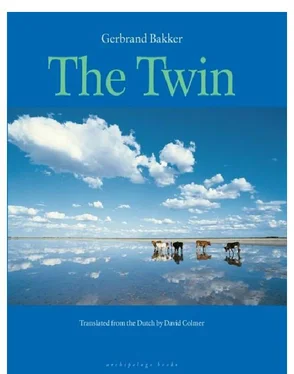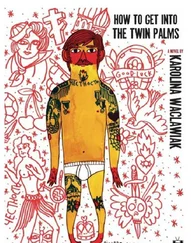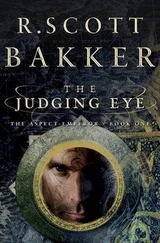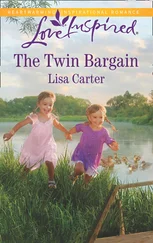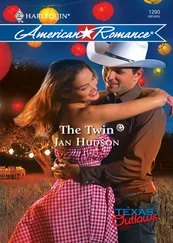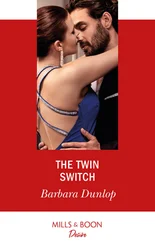Mother was an outrageously ugly woman. Someone who hadn’t known her would probably consider the photo on the mantelpiece laughable: bony, pop-eyed farmer’s wife with thrice-yearly hairdo does her best to assume a dignified pose. I don’t laugh at the photo. She’s my mother. But sometimes I have wondered why Father — who, when awake, no doubt lies there staring at the handsome figure he cut in those ancient photos — ever married her. Or rather, now that I’ve been looking at her photo for a while and thinking about the man upstairs, I wonder why she married him.
There isn’t much else left on the mantelpiece, which is black marble. A bronze candlestick holding a white candle, and an old pencil box with a picture of a belted cow on it. All the other knickknacks are in a box in Henk’s bedroom, along with other superfluous stuff. Henk’s room has become a storeroom. His bed, which has never served as a visitor’s bed, is hemmed in by all kinds of things he also saw and knew. His bedroom has become one big gathering point for the past, and the living museum piece in the adjacent bedroom just keeps on breathing. Breathing and talking. Even now, here, I can hear him muttering. Is he talking to the hooded crow? To the photos, or the six watercolor mushrooms?
Henk and I were born in 1947; I’m a few minutes older. At first they thought we wouldn’t live to see the next day (May 24th), but Mother never doubted us. “Women are made for twins,” is what she supposedly said after putting us on the breast for the first time. I don’t believe it: statements like that always emerge from a mass of events and comments finally to remain as sole survivor. Plenty of other things must have been said at the time and this was most likely a variation on something Father or the doctor said. Mother probably didn’t say much at all.
I have a memory I can’t have. I see her face from below, above a bright, soft swelling. I’m looking at her chin and, especially, at her slightly bulging eyes, which are directed not at me but at a point in the distance, nowhere in particular: the fields, maybe the dyke. It is summer and my feet feel other feet. Mother was a taciturn woman but she noticed everything. Father was the talker and he hardly noticed anything. He always just yelled his way through.
Someone taps on the window. Teun and Ronald are standing in the front garden, shouting and gesticulating. I walk to the front door.
“Helmer! The donkeys are loose!” Ronald says, in a tone that tells me he wishes the donkeys got loose every day.
“They’re still in the yard,” Teun says, in a tone that tells me that he too has heard what his little brother really wants.
They run ahead of me around the corner of the house. “Take it easy!” I call.
The donkeys are between the trees, about five yards in front of the partly open gate. The rope that usually keeps the gate shut is dangling from the concrete post. I realize what has happened.
“Well,” I say. “You’d better get them back in the paddock.”
“Who?” asks Ronald.
“Who do you think? You two.”
“Why us?”
“Because.”
Now that the donkeys have broken out, Teun and Ronald are scared of them. It’s like faucets: when you’re little they’re great things until you turn one on and have no idea how to shut it off again and panic about all the water that comes gushing out.
“Because?” says Teun. “What’s that mean?”
“It means,” I say, “that I know that you opened the gate because you were too lazy to climb over it, and that Ronald followed you, and that he opened the gate a little bit more.”
“Uh-huh,” says Ronald.
Teun shoots him an angry glance.
“Go on,” I say. “Push.”
“Push? The gate?”
“No, push the donkeys.” I stroll over to the gate, lift it and walk it around until it’s wide open. The boys don’t move and look at me disbelievingly and a little scared.
In the winter the donkeys often spend long periods in the donkey shed next to the chicken coop. Donkeys absolutely hate having wet feet. In the shed it’s dry and there’s a layer of straw on the ground. The shed is sixteen feet wide and twenty feet deep. It is open at the front, with an overhanging roof. The donkeys have a sixteen-by-fourteen stall and in the six feet that are left, at the front, there are hay bales and a bag of oats. I generally keep some sugar beets and winter carrots in a box. On a shelf I have a large knife, a currycomb, a brush, a coarse rasp, a hoof pick and a scraper. When the donkeys are inside, Teun and Ronald don’t let a day go by without visiting the shed. They sit on the hay bales or on the scattered straw in the stall. They like it most when it’s getting darker outside and I’ve turned on the light. Once I found them lying flat on their backs under the donkeys. I asked them why they were doing that. “We want to conquer our fear,” said Teun, who was about six at the time. Ronald sneezed because the donkey’s long winter coat was hanging in his face. Now the donkeys are out they are afraid.
“How?” Ronald asks.
“Nothing special. Just go and stand behind them and give them a push.”
“No way,” says Teun.
“They won’t do anything,” I say.
“You sure?” asks Ronald.
“I’m sure.”
They both go around behind a donkey and Ronald immediately starts pushing with all his might. Teun carefully taps his donkey’s backside to make sure it won’t kick. I’m curious to see what happens.
Nothing happens. I walk to the barn.
“Where are you going?” asks Teun.
“I’ll be right back,” I say.
In the barn I scoop a few handfuls of feed into a bucket and peek around the corner at the boys to check on things before going back. Nothing has changed. When I see Teun looking around anxiously, I stroll up to them. “Not working?” I ask.
“No,” Ronald says. “Stupid animals.”
“What?” I ask.
“Well. .” he says.
“They won’t budge,” says Teun.
I walk into the paddock and shake the bucket. Ronald falls over, that’s how fast the donkey he was pushing rushes over to me. I empty the bucket and close the gate. Afterwards the three of us spend a while leaning over the gate watching the donkeys eat the feed. I’m standing on the ground, Teun’s on the bottom bar and Ronald is on the second-to-bottom bar.
“You won’t do it again, will you?” I say.
“No,” they both say at once.
They jump down and walk into the yard. When they’re almost at the causeway, Teun turns around. “Where’s your father?” he shouts.
“Inside,” I say.
He doesn’t need to know any more. They cross the causeway and turn right.
I stay behind with the donkeys. They don’t have names. When I bought them, years ago, I couldn’t think of any names and after a while it was too late, they had already become “the donkeys.” Father asked me if I’d gone mad. “Donkeys?” he said. “What do we want with bloody donkeys? They’ll cost us a fortune.” I told him they weren’t our donkeys, but my donkeys. The livestock dealer was more than happy to arrange it — something different for a change. The donkeys are mixed breed, they’re not French, Irish, Italian or Spanish purebreds. They are very dark gray and one has a light-gray muzzle. I click my tongue at them and whisper, “Where’s your father?” They come up to me and nudge me on the head with their different colored muzzles.
The cows are restless, two of them kicked out when I went to attach the teat cups. Until recently I was sure it was because they weren’t getting out any more, but now I’ve begun to suspect that it’s me who’s restless. In that regard cows can be just like dogs — dogs are supposed to be able to sense their master’s state of mind as well. I don’t have a dog. We’ve never had dogs here.
Читать дальше
